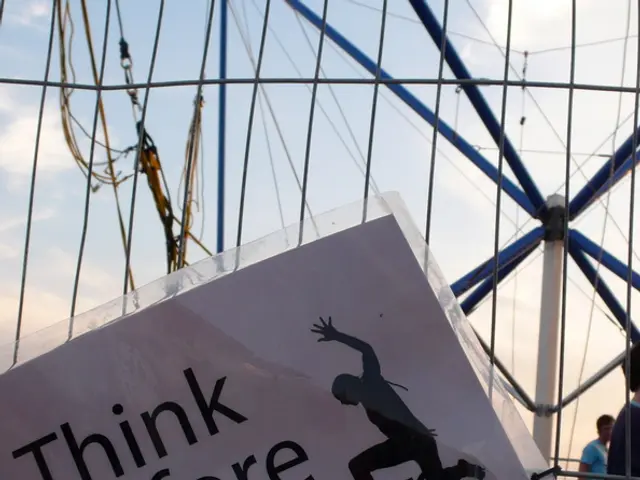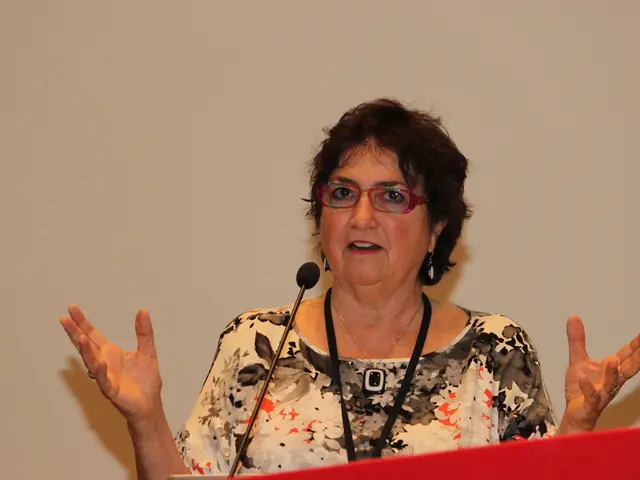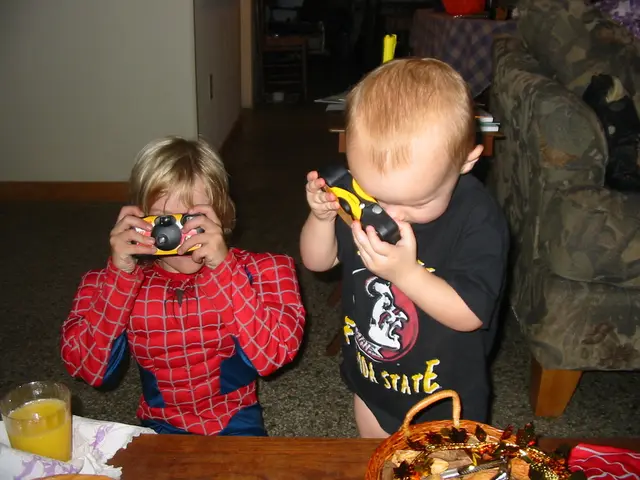Daughter discovers deceased mother in Los Angeles homeless shelter. Determining cause of death: overdose or murder?
Daughter of U.S. Army Veteran Questions Police Handling in Mother's Death Investigation
In the heart of downtown Los Angeles, the daughters of a 46-year-old woman, Lucrecia Macias Barajas, are questioning the Los Angeles Police Department's (LAPD) handling of their mother's case after she was found dead in a homeless encampment.
Barajas was discovered on May 12, by one of her daughters following a trace of her mother's cellphone. The encampment, situated in a notorious Westlake cul-de-sac, was also home to a lifeless 39-year-old man, two live dogs, and another body, according to officials.
A resident's video captured the heart-wrenching moment when one of Barajas' daughters discovered her mother's body, wailing on the ground. In a later instance, she pleaded with officers to remove her mother's corpse.
Almost a month prior to Barajas' death, a man and a woman were found dead inside a tent in Westlake. The LAPD classified the incident as a suspected drug overdose, and initially declared it not to be investigated as a homicide. However, the daughters of the deceased woman allege that the LAPD were too hasty in ruling out foul play.
Some suspicious circumstances surrounding Barajas' death include the entrance to the tent-like shelter being secured with a lock from the outside, and residents reporting they heard a woman screaming for help hours before the bodies were found. Hans Salinas, 25, and his girlfriend reported hearing an argument and a woman desperately crying for help around 3:30 a.m. on May 11. The crying came from the direction of the makeshift tent, but Salinas remained in his car due to fear of attack.
LAPD officials have stated they will investigate the family's concerns regarding their mother's death. Councilmember Eunisses Hernandez's office has assured that they are working with the LAPD to provide the family with the answers they deserve.
Barajas' daughters have requested anonymity out of safety concerns. They presented a detective's card with "overdose investigation" written on the back and contrasted their mother's phone tracking app data, which showed she arrived at the encampment two hours before the screaming was reported, with the time the bodies were discovered. The same app located her mother's phone in a park three blocks away from the crime scene hours after the bodies were removed.
The daughters have additionally accused the police of negligence in securing the crime scene and allowing evidence to disappear – including security cameras attached to the tent and their mother's cellphone. A resident's video obtained by TV station NBC4 showed someone pulling the cameras down. The daughters allege that the dogs, a pit bull mix and a shepherd mix, remained inside with the bodies for at least eight hours after Barajas' body was found. The dogs, which were held for evidence by LA Animal Services, reportedly bit into the corpse.
The corpses have yet to be autopsied and any related investigation details are under review by the LAPD. On a recent afternoon, a homeless man, declining to give his name, nearby residents placing candles and flowers as a memorial to Barajas, recalled knowing her as "Pablo." He shared that a woman who died in an RV fire on the same street in January, identified as 23-year-old Angela Castillo, was the girlfriend of the man found dead inside the tent.
The deaths in Westlake have brought renewed attention to the troubled area plagued by gang violence, drug use, homelessness, and organized retail theft. City officials claim they have made strides in addressing the issues, reporting a drop in crime in recent months, save for an increase in burglaries and break-ins according to the LAPD's crime statistics.
Locals have expressed concerns about the LAPD's failure to act against encampments near Miguel Contreras Learning Complex, despite signs prohibiting camping designating the area as a 41.18 special enforcement zone. While the tent where the bodies were found was on private property, it was visible from the street according to various news station videos.
The death of Lucrecia Macias Barajas and the subsequent questions about the investigation into her death underscore the complicated relationship between the police, the homeless population, and the residents of Los Angeles. GoFundMe campaigns have been established to support Barajas' family in covering funeral expenses, with calls for action to address homelessness and end encampments.
References:[1] https://www.latimes.com/Homelessness_in_LA/LA-WI-homeless-lapd-probe-overdose-20230517-6kmrcb3mrndbh5o442tzjjixzq-story.html[2] https://www.latimes.com/california/story/2023-04-24/lapd-probation-x-games-deaths-investigations[3] https://www.latimes.com/california/story/2023-05-04/lapd-eunisses-hernandez-homeless-dead-bodies-westlake
- The editorial section of a local California newspaper might echo the daughters' opinion, questioning the Los Angeles Police Department's (LAPD) handling of the death investigation of Lucrecia Macias Barajas.
- In the realm of general-news, discussions about the crime rates in Los Angeles might focus on the death of Lucrecia Macias Barajas and the alleged negligence of the LAPD in her case.
- Hollywood's yearly award shows might address the issue of homelessness in California, possibly mentioning Lucrecia Macias Barajas' death as a symbol of the troubling circumstances faced by the homeless population in the state.
- In the world of business, some companies in Los Angeles might show support for the family of Lucrecia Macias Barajas by contributing to GoFundMe campaigns for funeral expenses or advocating for action against homelessness.
- Political debates in California might bring up Lucrecia Macias Barajas' death as an example of the need for better resources and oversight in the handling of homeless encampments and crime investigations.
- The case of Lucrecia Macias Barajas might also appear in crime-and-justice reports, with focus on the strange circumstances surrounding her death, the LAPD's subsequent investigation, and the potential errors or oversights that may have occurred.







